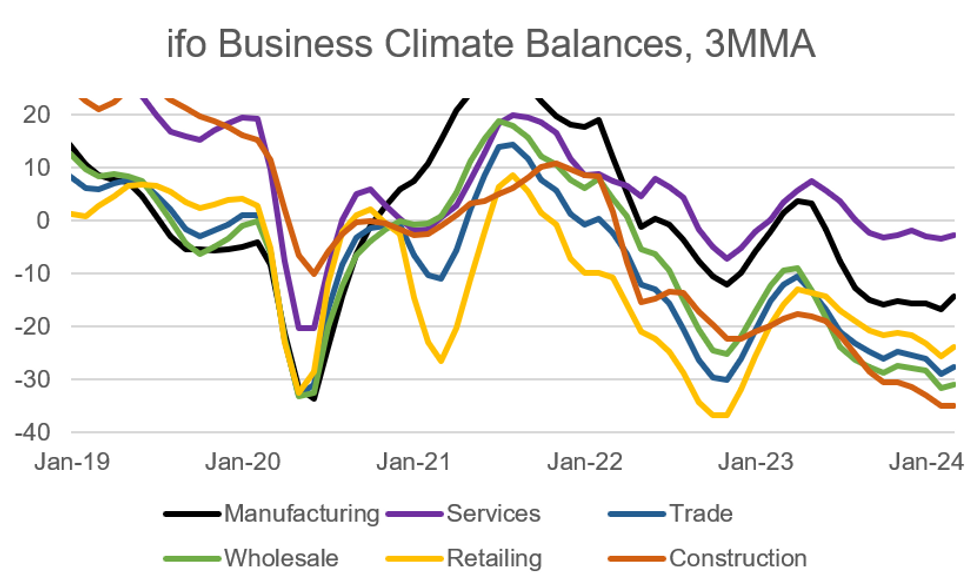-
Policy
Policy
Exclusive interviews with leading policymakers that convey the true policy message that impacts markets.
LATEST FROM POLICY: -
EM Policy
EM Policy
Exclusive interviews with leading policymakers that convey the true policy message that impacts markets.
LATEST FROM EM POLICY: -
G10 Markets
G10 Markets
Real-time insight on key fixed income and fx markets.
Launch MNI PodcastsFixed IncomeFI Markets AnalysisCentral Bank PreviewsFI PiFixed Income Technical AnalysisUS$ Credit Supply PipelineGilt Week AheadGlobal IssuanceEurozoneUKUSDeep DiveGlobal Issuance CalendarsEZ/UK Bond Auction CalendarEZ/UK T-bill Auction CalendarUS Treasury Auction CalendarPolitical RiskMNI Political Risk AnalysisMNI Political Risk - US Daily BriefMNI Political Risk - The week AheadElection Previews -
Emerging Markets
Emerging Markets
Real-time insight of emerging markets in CEMEA, Asia and LatAm region
-
Commodities
Commodities
Real-time insight of oil & gas markets
-
Credit
Credit
Real time insight of credit markets
-
Data
-
Global Macro
Global Macro
Actionable insight on monetary policy, balance sheet and inflation with focus on global issuance. Analysis on key political risk impacting the global markets.
Global MacroDM Central Bank PreviewsDM Central Bank ReviewsEM Central Bank PreviewsEM Central Bank ReviewsBalance Sheet AnalysisData AnalysisEurozone DataUK DataUS DataAPAC DataInflation InsightEmployment InsightGlobal IssuanceEurozoneUKUSDeep DiveGlobal Issuance Calendars EZ/UK Bond Auction Calendar EZ/UK T-bill Auction Calendar US Treasury Auction Calendar Chart Packs -
About Us
To read the full story
Sign up now for free trial access to this content.
Please enter your details below.
Why MNI
MNI is the leading provider
of intelligence and analysis on the Global Fixed Income, Foreign Exchange and Energy markets. We use an innovative combination of real-time analysis, deep fundamental research and journalism to provide unique and actionable insights for traders and investors. Our "All signal, no noise" approach drives an intelligence service that is succinct and timely, which is highly regarded by our time constrained client base.Our Head Office is in London with offices in Chicago, Washington and Beijing, as well as an on the ground presence in other major financial centres across the world.
Real-time Actionable Insight
Get the latest on Central Bank Policy and FX & FI Markets to help inform both your strategic and tactical decision-making.
Free AccessIFO Improvement Looks More Broad-Based Than Composite PMI
Germany's IFO Business Confidence Index rose to 87.8 in March, higher than both consensus (86.0) and February's value (85.7, revised up from 85.5), and the highest since June 2023. This mirrors March's flash Composite PMI directionally, but the uptick was broad-based in the IFO whereas the flash PMI saw the manufacturing sector deteriorating further. Notably, business expectations improved in both surveys.
- Both the Current Assessment and the Expectations readings came in higher than in February and than expected, at 88.1 and 87.5, respectively (vs 86.9 and 84.4 priors).
- March's increase was broad-based, with all of the manufacturing, services, trade, and construction sectors printing higher than in the month prior. Specifically, the manufacturing diffusion balance came in at -10.0 (the highest since last June, vs -17.1 prior), services at 0.3 (vs -4.0 prior), trade at -22.0 (vs -30.8 prior), and construction at -33.5 (vs -35.4 prior).
- March's Germany flash PMI also increased on the composite level but but was only driven by an uptick in the services sector (composite 47.4 vs 47.0 cons and 46.3 prior; services 49.8 vs 48.8 cons and 48.3 prior). In the manufacturing sector, the PMI decreased for the second consecutive month, coming in at 41.6 (vs 43.0 cons; 42.5 prior), and has now pared about half of its gains since its recent low in July 2023. However, business expectations saw an improvement also in the PMI data, coming in higher for the sixth consecutive time.
- Looking at the less volatile 3MMA measure, the previous broad downtrend in IFO was broken in March - all sectors printed higher than last month. The uptick was most notable in the manufacturing sector.
- Overall, the data provide another sign that economic conditions in Germany appear to be bottoming out. Industrial production is bouncing back according to the most recent print in January, though some other data leaves the overall picture ambiguous: headline and "core" factory orders for example remain in a lengthy downtrend.
- MNI's compilation of analyst estimates for German real GDP growth this quarter is looking weak after downward revisions in recent months, now standing at -0.3% Y/Y. For the rest of the year, analysts see a gradual recovery for the German economy, with yearly growth in the consecutive quarters currently estimated at -0.3%, 0%, and 0.6%.
 MNI, Destatis
MNI, Destatis
To read the full story
Sign up now for free trial access to this content.
Please enter your details below.
Why MNI
MNI is the leading provider
of intelligence and analysis on the Global Fixed Income, Foreign Exchange and Energy markets. We use an innovative combination of real-time analysis, deep fundamental research and journalism to provide unique and actionable insights for traders and investors. Our "All signal, no noise" approach drives an intelligence service that is succinct and timely, which is highly regarded by our time constrained client base.Our Head Office is in London with offices in Chicago, Washington and Beijing, as well as an on the ground presence in other major financial centres across the world.
